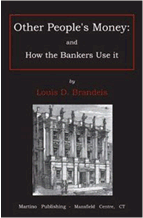

 |  |
Bankers and Other People's Money
|
Please go to the new Coffee Coaster site implemented more gracefully in Wordpress. Full conversion by 9/12. This page @ http://brianrwright.com/CoffeeCoasterBlog/?p=1524 |
 So this is what it looks like on the inside of the Money Trust system.
Louis Brandeis was a remarkable public-spirited individual who became a top public-affairs attorney. Graduating from Harvard, he developed a highly successful law practice in Boston. Yet Brandeis was a different breed of lawyer, one who later in his legal career devoted half of his time to legal representation —without fee—of the general public and smaller-business interests against powerful government or corporate interests. This preference of his was almost as uncommon for rich attorneys in those days as it is today.
So this is what it looks like on the inside of the Money Trust system.
Louis Brandeis was a remarkable public-spirited individual who became a top public-affairs attorney. Graduating from Harvard, he developed a highly successful law practice in Boston. Yet Brandeis was a different breed of lawyer, one who later in his legal career devoted half of his time to legal representation —without fee—of the general public and smaller-business interests against powerful government or corporate interests. This preference of his was almost as uncommon for rich attorneys in those days as it is today.
Fair enough, and much of his effort was to help citizens form cooperative ventures in competition with top-down fiefdoms run from the privileged financial classes. Like many Progressives of the day, Brandeis began his reform work at the local level, fighting corruption in municipalities and public utilities or transportation franchises. But he soon began to see beyond the city limits and perform "citizens advocacy" for statewide matters, such as savings bank insurance. This orientation toward public service—which nonetheless invariably required state intervention of one form or another—I believe explains what I find to be a huge puzzle: why didn't he address the even greater rapaciousness of the private finance capitalists behind the Federal Reserve System, enacted in 1913? I'll speculate at the end.
Another noteworthy accomplishment of Louis Brandeis is that he became an adviser to Woodrow Wilson and achieved a reputation as a champion of the "little guy" against the Money Trust—Brandeis' Money Trust is a lower-level, predominantly American, manifestation of my own "Anglo-American Financial Oligarchy." Essentially, this is JP Morgan and his crony-finance capitalists at the turn of the 20th century, aka the Robber Barons (RBs). Wilson considered Brandeis for attorney general in his administration, but the outcry from the RB community caused him to back down.
Instead he nominated Brandeis to the Supreme Court, on which he served for 23 years. According to the preface, "Conservatives during this time [until 1940] dominated the Court and blocked some of these regulatory statutes; during the 1930s large parts of Franklin Roosevelt's New Deal were struck down as unconstitutional. But the agenda was changing and Brandeis did much to lay the foundation for that change." [Thumbs down.] Regarding civil rights and civil liberties, however, "It was Brandeis who first suggested that the 14th Amendment's due process clause might also apply the Bill of Rights to the states..." [Thumbs up... at least IMHO.] He was a well-written and conscientious jurist by all accounts, and is known for advocating, along with Oliver Wendell Holmes, that free speech be protected even in wartime.
Let's just say as a Supreme he had a mixed record.
One other characteristic is Brandeis' role in early Zionism in America. Zionism is the movement to create a Jewish homeland in Palestine. Journalist Jacob de Hass interviewed Brandeis and in the conversation introduced him to the ideas of the founder of modern Zionism, Theodor Herzl. Brandeis signed up, then took an active role in 1914 by heading a committee to provide for Jewish settlements in Palestine. Brandeis energized the American Zionist movement, increasing its membership from 12,000 in 1914 to 186,000 in 1919. He used his connections to the Wilson administration and in 1917 played a key role in securing Wilson's endorsement of the Balfour Declaration—in which the British promised to support a Jewish homeland in Palestine after WWI.
Reading further, one accepts that Brandeis' Zionism proceeded from a humanitarian and practical perspective. But also, just as many European-Americans regard the genocide perpetrated upon the American Indian populations as incidental or unavoidable, it appears Brandeis had little concern for the property or lives of the non-Jews who had called Palestine home for centuries.
This little monograph from Mr. B, Other People's Money and How the Bankers Use It, was a series of articles written for Harper's Weekly between August 1913 and January 1914. A statement to a reporter perfectly describes Brandeis' main premise: "The control of capital is, as to business, what the control of water supply is to life. The economic menace of past ages was the dead hand which gradually acquired a large part of all available lands. The greatest economic menace of today is a very live hand—[the oligarchy of 'finance capitalists' or RBs]." —pg. 16
Another fine premise coming from Mr. B is, that unlike the conventional wisdom that bigness is better, cartel capitalism is hugely inefficient and economically devastating to the many individuals who participate in a complex, modern economy. Brandeis is a staunch advocate, at least in print, of "small-unit" enterprise, what we might today call distributed capitalism, community-based market economics, or even agorism. In one chapter, he describes how the "monopoly bankers" become "investment bankers" become "securities sellers..." by acquiring control—through interlocking directorates (a practice he wanted to outlaw)—of the very corporations they are investing in. Thus, they participate on both sides of the securities transaction. Hardly an inducement to efficiency.
Indeed, in Chapter 7: Big Men and Little Business, Brandeis chronicles business after business where centralization results in massive inefficiencies and losses obscured by the monopoly control of the industry: automobiles, communications, railroads, electrics, shipping, finance instruments. He conveys the details so thoroughly, it's like watching an independent film documentary today, say, Who Killed the Electric Car?.
The only problem is he gets so wrapped up in the gory details, he loses the big picture. His sights are on JP Morgan and that motley crew of RBs, but what about the motley crew of RBs behind the establishment of the Fed? That cabal, led by Nelson Aldrich[1], a JP Morgan man, too, all the way, set up the Federal Reserve with the following objectives:
So Brandeis had to know who was behind the Fed... the same men he was condemning in his analysis. Why no slam of the Fed? Old Lou had a ringside seat for chrissakes. Idealism? Zionist agenda? [Rockefeller and Rothschild dynasties have always been substantial backers of the Zionist movement.] How does an honest man of your intellect gloss over the crimes of the Fed, even in its infancy? Perhaps we'll never know.
Well, that's all I have. I'm no econ guy, but OPM is good econ stuff.
[1] Republican Whip in the Senate, chairman of the National Monetary Commission, business associate of J.P. Morgan, father-in-law to John D. Rockefeller, Jr.
###
2010 December 03
Copyright © Brian Wright | The Coffee Coaster™
Bankers | Corporatocracy| Other People's Money | Brandeis | Oligarchy
 |
||||